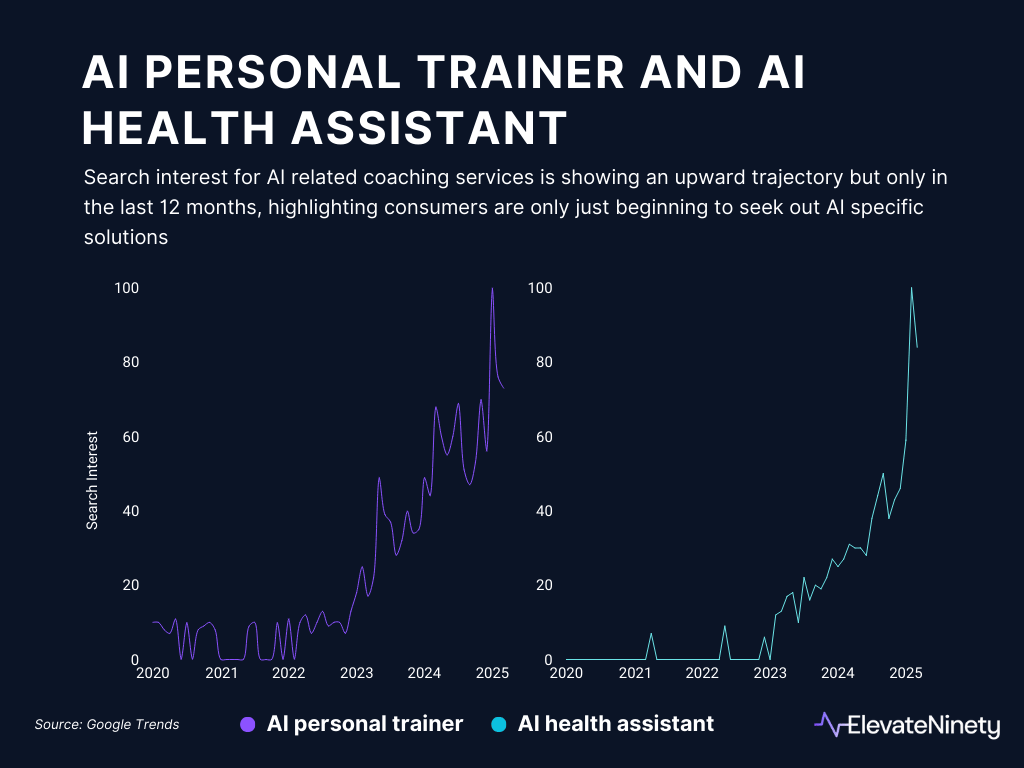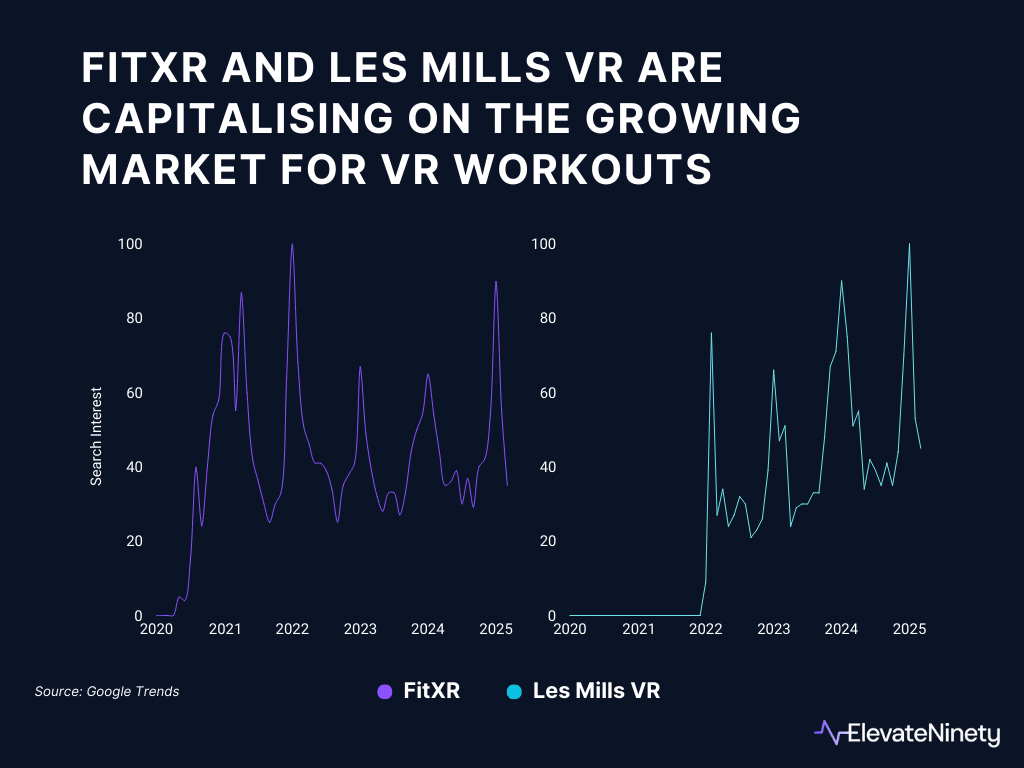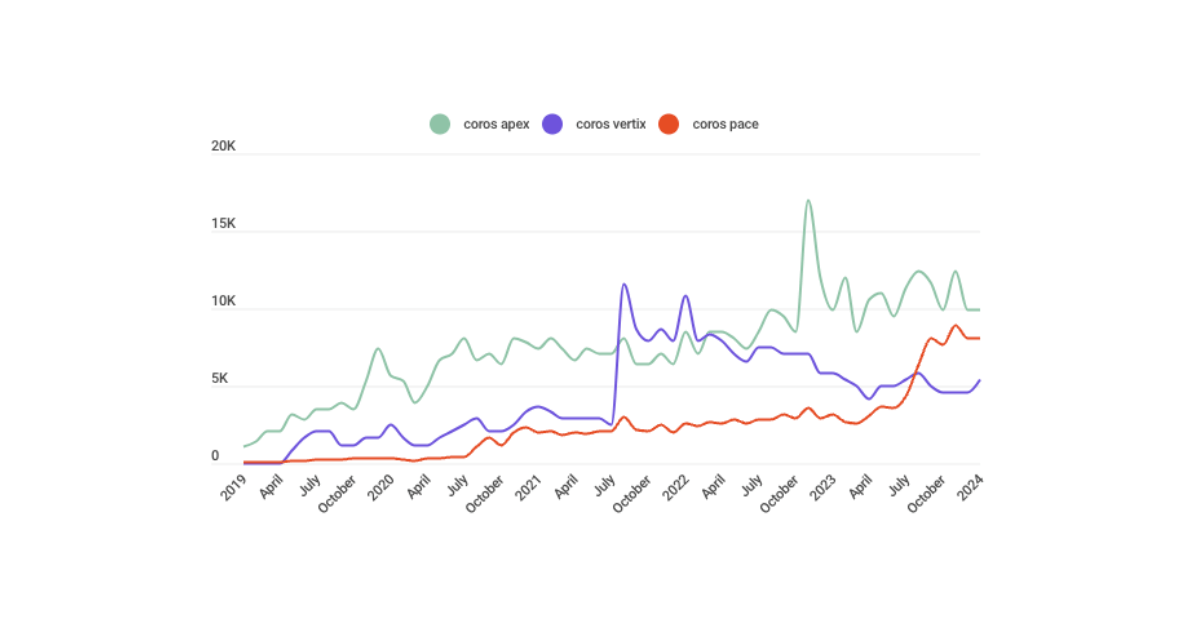Have you ever wondered if a virtual coach could replace your personal trainer? As artificial intelligence makes waves across the health and fitness industry, more people are doing just that. While it’s not without its faults, AI offers more affordability, accessibility and high levels of personalisation— an attractive option for anyone improving their health from their phone.
As search trends indicate, AI coaching is still an evolving phenomenon. But one thing is clear; as technology becomes smarter, interest in AI coaching continues to grow.
What Do the Search Trends Say?
As Google search trends indicate, AI coaching is only gaining more interest. While it’s still a fairly early development, searches for both “AI personal trainer” and “AI fitness coach” started climbing in spring 2023 and have stayed relatively consistent ever since.
Not surprisingly, search engines spike in January, with New year’s resolutions kicking in. In fact, its highest peak was recorded quite recently in January 2025, exhibiting that consumer interest in AI coaching continues to rise. However, despite rising interest search volumes remain relatively low. For example, ‘AI personal trainer’ receives on average 1800 global monthly searches and ‘AI health assistant’ receives 300 global monthly searches. However, it remains to be seen if consumer search behaviour for specific ‘AI’ related searches will reach high volumes. AI features will increasingly be common in such apps and platforms rather than an added value that people search for. We anticipate that branded search for specific apps and platforms that integrate innovative AI features will likely generate the highest volumes.

Why Are People Turning to AI Coaches?
Affordable and Accessible
If you’ve ever looked into hiring a personal trainer, you’ll know it’s not cheap. As of January 2025 in the UK, you’re looking at an average cost between £30 to £50 per session. In today’s economic climate, this could put good quality coaching out of reach for a lot of people.
Moreover, the term ‘AI’ itself is not just a buzzword as consumers are beginning to see the value in AI assisted features. Furthermore, from the brands perspective, AI is a feature that can either add additional revenue or utilise as a commercial pull to their brand. However, even with paid AI features, AI coaching still comes at a fraction of the cost when compared to in-human service charges. Apps like Humango offer personalised training with in-built AI features at a fraction of the cost, with prices ranging from $9 a month to $29 a month.
AI coaching isn’t just about saving money, in my view it has the potential to have great social impact. With a coach being an app away, those who might not usually have access, like people in remote, under resourced and low income areas, can get involved in high quality exercise.

Hyper-Personalisation
One of AI’s biggest selling points is the real time adaptation. No more waiting for a trainer’s availability, booking appointments or heading to the gym just for an assessment. AI coaching can tailor coaching to your performance and progress just like a human trainer, without the scheduling hassle.
Despite this, surely this is nothing new? Isn’t personalisation what human trainers already do? Yes, but AI takes this feature to new levels, continuously tracking insights and adjusting workouts in real time, all without human bias or inconsistency.
Hyper personalisation has become quite the macro trend in recent years. Google trends exemplify rising searches for ‘tailored fitness’ and consistent results in ‘personalised health’ over the past five years. Although these aren’t specifically AI, personalised features are clearly what people want and is an expectation for health coaching.
The search data suggests to me that whilst human personalisation remains popular, AI can go above and beyond. In particular, AI can crunch data sets of varying metrics and from multiple devices which offers a truly personalised experience and feedback. For health conscious consumers, whether their goal is fitness, nutrition, lifestyle or mental health being able to receive a single view of their own health with real-time expert advice and insight is highly desirable. This further indicates that searches related to personalised AI coaching will only rise.

Gamification and Staying Motivated
With around 50% of people relapsing in their fitness routines within the first few months of starting, trainers face a big struggle — getting people to stick to it. Workouts get boring, motivation dips and results don’t appear instant. However, AI coaching brings gamification to the table.
Take Zombies, Run!, for example. This is not your traditional running app, it turns workouts into zombie survival mission. Moreover, AI powered apps are merging video game features, goal driven challenges and reward systems to keep users engaged and emotionally invested in their progress. From my perspective, when fitness feels like a game instead of a chore, I would be far more likely to stay on track.
Trending AI Coaches
Strava — Using its monetised ‘athlete intelligence’ feature, analysing activities, trends, recovery needs and even flagging when an activity isn’t done properly. With a massive 40 million activities uploaded every week, one thing is obvious— people data driven insights in their coaching.
Whilst search interest spiked during coronavirus, searches for ‘Strava’ in the past five years have remained consistent. This just goes to shows AI influence in coaching is here to stay.
Welltory – Welltory is an app that leverages artificial intelligence to deliver bespoke wellness coaching. Utilising AI, the app analyses data from smartphones and wearable devices to provide insights into heart rate variability, stress levels, and overall well-being. Also, it provides personalised recommendations on exercise, sleep, and nutrition, continuously adapting to the user’s unique health data. Welltory is increasing in branded search and demonstrates how AI will become a catalyst for analysis various wearable tech to tailor wellness advice uniquely to the individual.
BetterHelp — AI coaches aren’t just popular in physical fitness, but also rising in mental health coaching. BetterHelp offers a blend of human services, AI chat bots and AI driven matching to connect patients with therapists. Although debates around AI therapy are ongoing, search trends for ‘Betterhelp’ have continued to rise, showing AI mental health coaching is in demand.
ChatGPT – One of the most well-known chat bots, ChatGPT is being used for AI assisted coaching purposes. There has been a rise in specific coach GPT’s, from physical and mental health coaching. Furthermore, searches in ‘ChatGPT coaching / coach’ have surged since early 2023.
It’s clear that people want personalised AI coaching beyond traditional means, but for everyday guidance. Whether that be goal setting, planning or self-improvement, AI coaching is becoming a tool for bettering yourself.

A Reality Check
While all the trends in search for AI related coaches are showing upward curves, it has still yet to build the search volume comparative to traditional services. For example, ‘personal trainer near me’ far exceeds any of it’s AI and digital counterparts. In terms of therapy and counselling, search for online therapy has become a leading search in this sector. However, the expectation from most consumers whom search for this service is that they will engage with a human therapist.
What About Privacy?
AI coaching apps like Strava and Betterhelp collect a ton of data such as your workouts, private health stats and even biometric info. A data breach could have really serious consequences, particularly for mental health coaching. Therefore, it’s safe to say trust is a massive part of these platforms, and realistically not everyone is comfortable sharing such sensitive information.
How Does This Affect Search Trends?
Yes, AI coaching related search trends are on the rise, however, it has not overtaken human coaching. In fact, the search volume for AI related search topics is overwhelmingly insignificant when compared to searches e.g. a “personal trainer” Although, AI has become a feature that many health conscious consumers are expecting will play a role in improving their situation. The industry is increasingly witnessing a combination of human and AI powered interaction that improves the overall coaching experience. We are yet to see a shift in trend to where people looking for coaching are completely satisfied with 100% AI coach without any human interaction.
What’s Next For AI Coaches?
AI driven VR workouts
Many experts are pointing to the emergence of AI powered VR workouts as the next big thing. It’s easy to see why. They’re fun, immersive and there’s no need for lots of equipment, just put on your headset and you’re ready.
VR apps like LesMills VR provide users with interactive combat workouts, designed by real life coaches. However, AI is not yet the buzzword for VR fitness apps like Les Mills VR. Unlike other industries, VR workouts are not really monetising AI content like traditional AI fitness apps are.
But this is on the brink of changing. Similarly to the development of AI in coaching apps, VR workouts are becoming more personalised, with intelligent feedback and deeper levels of immersion. In Google search trends, ‘Les Mills VR’ is by no surprise most popular in January and remains roughly the same throughout the rest of the year. Clearly people enjoy the features of VR fitness; turning workouts into an experience that feels like a real-life class, but from the comfort of home.
FitXR is ahead of the game. Already utilising AI, the app integrates wearables to optimise training experiences, providing real time feedback and motion capture. Like Les Mills VR, search trends for ‘FitXR’ are peak in January and are consistent through the rest of the year.

AI and VR Versus In-Person Coaches
However, desire for in person coaching is still in demand. When compared to searches like ‘personal trainers near me’, most AI driven VR coaching programs have little to no search data. Clearly, they have a long way to go.
That being said, having looked at trends in traditional AI coaching apps, there’s a clear trajectory. AI powered VR coaching will likely become a selling point, and as technology advances, hyper-personalisation and feedback will become embedded in VR fitness.
If the search trends tell us anything, AI coaching is gaining traction, but it isn’t anywhere close to reaching its full potential. Searches for ‘personal trainers/coaches’ continue to dominate search trends, showing many still value in person relationships and human expertise for any type of health, mental health or fitness coaching. Additionally, AI creates a lot of issues, including privacy and accuracy, that understandably put people off.
There is no denying, however, that AI can take coaching to new levels. AI can deliver hyper-personalised feedback, data driven plans and levels of customisation that human trainers simply can’t. Many AI coaching apps are beginning to monetise these features, and it seems VR fitness is following suit.
This raises an important question; at what point will AI eclipse the human trainer? Right now, this is unclear. However, with search trends revealing more and more, perhaps this shift is not too far in the future.





